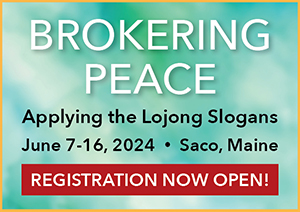 SLOGAN 20 • Of the two witnesses, hold the principal one.
SLOGAN 20 • Of the two witnesses, hold the principal one.
This slogan is about aloneness and confidence. It gets to a core issue on the path of practice, which is the fact that each of us must travel it alone and by ourselves. Of course we may be in a community or a sangha, but within a sangha of one-hundred members, there are a hundred different paths. We may be in one tradition, but the way we each go about it is unique. Life altogether has that same quality. We come in alone, we go out alone, and in between no matter how many friends and acquaintances we may have, we are still alone at a fundamental level.
It is hard to accept this kind of existential aloneness in ourselves or in others. We want people to really know us, and we want to have some way of truly understanding others. But no matter how much we bare our hearts, we can never convey the fullness of our experiential reality. And no matter how much we probe, we can never fully penetrate another person’s experience.
According to this slogan, if we want feedback as to how we are doing, we must rely on our own judgment. But it is unsettling to realize that no one else really knows what is going on with us. So we look around for confirmation. We look to others for feedback and to find clues as to how we are doing from others. Instead of looking directly at our own experience, we try to find it in what is reflected back to us from outside. But that reflection is not all that trustworthy. People are easily fooled by appearances and judge what is going on according to their own biases and preconceptions.
It is easy to become so used to looking for the approval of others that we lose confidence in our own self-knowledge. But according to this slogan, we must learn to trust what we know and not rely so heavily on others. Only we really know when we are being phony or genuine, aware or unaware, compassionate or uncompassionate. No matter what may be going on at the surface, and how confused we may feel, deep down we know exactly what is going on and what we are up to. That is the witness we must hold.
Today’s practice
Pay attention to the loneliness of experience. Notice the difference between seeking for confirmation and direct witnessing. What makes you trust or distrust your own experience?
